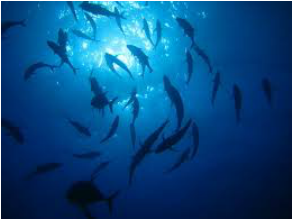 ocean fish - pixabay.com
ocean fish - pixabay.com New methodology highlights more alarming results than in a report two years ago.
Compiling a global average of the decline in species involves tricky statistics, often comparing disparate data sets. Although the zoological team say they've improved their methodology, the results, two years later, are even more alarming.
Populations of mammals, birds, reptiles, amphibians and fish have declined by an average of 52% since 1970.
The authors analysed more than 1,200 species of marine creatures in the past 45 years.
Some species that people rely on for food are declining faster. They noted 74% drop in the populations of tuna and mackerel.
Some critics say the analysis is not statistically valid.
'The society's report, in conjunction with the pressure group WWF, says humans are cutting down trees more quickly than they can re-grow, harvesting more fish than the oceans can re-stock, pumping water from rivers and aquifers faster than rainfall can replenish them, and emitting more carbon than oceans and forests can absorb.' (WWF protects endangered wildlife and environments, tackles climate change and promotes sustainable use of resources.)
In addition to human activity such as overfishing, the report also says climate change is having an impact. Source: BBC.
 www.flickr.com
www.flickr.com If I asked my husband, he'd say he cares about animals, but he's too busy trying to survive himself. I think he speaks for many people.
But, unless we pay attention to what's going on around us, we'll run out of food. I remember China's policy which began in the 70s. They limited each family to one child, and halved their population in a generation. Perhaps it's time we gave some thought to the ever expanding numbers of humans occupying the planet.
That's all very well for me to say—I'm old, I've had my children.
How would you solve the problem?





 RSS Feed
RSS Feed
